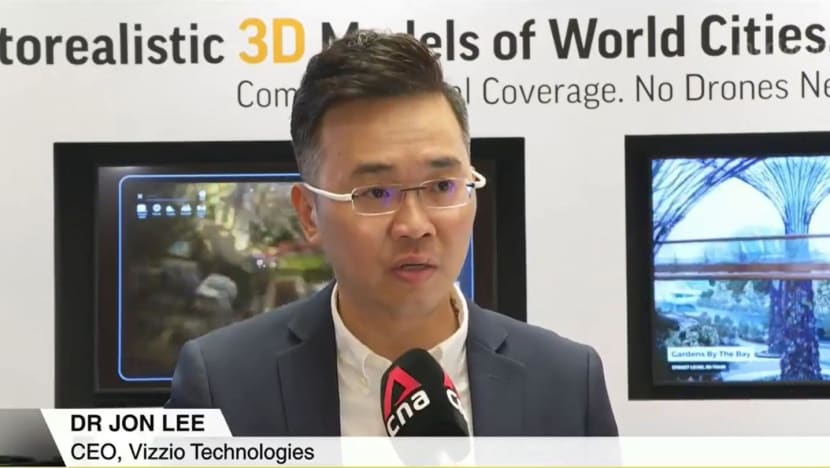Commentary: Is Singapore’s tech start-up scene giving CEOs a free pass for deception?
Founders of fledgling startups might be tempted to exaggerate achievements to pursue their ambitions, but this can be taken too far, says tech investor Gwendolyn Regina.

Screengrab of an August 2022 interview with Vizzio CEO Jon Lee.

This audio is generated by an AI tool.
SINGAPORE: Exactly 10 days after news broke that Vizzio Technologies founder and CEO Jon Lee had forged his computer science doctorate from the University of Cambridge, the artificial intelligence start-up on Friday (Jan 26) announced the appointment of an interim CEO.
It expressed confidence that “this leadership enhancement, along with our commitment to robust governance, positions Vizzio for a strong future”.
Vizzio's statement was extremely vague to say the least: Not once did it mention Mr Lee's name, or explain why the company needed an interim CEO. It also did not explain whether action had been taken against Mr Lee for forging his credentials or why the board had so resolutely backed him initially. "We cannot, and will not, take his life's work away from him," the board said a statement signed by Vizzio chairman Abu Bakar Mohd Nor on Jan 16.
Visitors who click on the LinkedIn icon on the Vizzio's website are directed to Mr Lee's profile, where he is still identified as founder, CEO and vice chairman.
SILENT LEGITIMISATION OF DISHONESTY?
The news first broke when Mr Lee, who founded Vizzio in 2019, admitted in an interview with online publication Tech In Asia that he had faked his credentials.
The backlash was initially relatively muted. One prominent AI leader, Lee Kai-fu, quit Vizzio’s board, but the rest stood by their CEO.
In a statement released on Jan 17, Jon Lee apologised for misrepresenting his academic qualifications, but added that Vizzio’s board and shareholders had decided that he would continue to serve as CEO.
This seems jarring when others who fabricated their credentials in Singapore have faced worse consequences. In December 2023, a woman who forged a bachelor’s degree to secure several jobs over 16 years was sentenced to eight months’ jail. She was caught when one employer fact-checked her credentials with Nanyang Technological University (NTU), who then lodged a police report. Mr Lee’s case may become a non-issue if no Vizzio stakeholder takes legal action.
Why was punishment administered in one case but not the other? Does this suggest double standards between corporate leaders and employees, or the tech sector and the rest of the business world?
Claiming to have a Cambridge PhD wasn’t the first time that Mr Lee lied. In 2001, he was fired by software company Elipva for fabricating prestigious awards and fellowships in his resume. He was serving Elipva as chief technology officer under the name Dennis Lee.
In its Jan 16 statement, Vizzio’s board appeared to defend Mr Lee’s history, saying that Mr Lee shouldn’t be sanctioned again for his actions when he was a 29-year-old technopreneur.
But what started as one lie more than two decades ago seems to have evolved into a prolonged charade under new guises and a new company. After news reports suggested that Vizzio inflated its list of customers, the company removed logos of clients from its website.
The apparent pardoning of Mr Lee raises questions about honesty and accountability.
Boards are supposed to provide checks and balances to the executive team running the company, and to suggest disciplinary action if necessary. By not holding Mr Lee responsible for his long-standing deception, there is a risk of normalising dishonesty at the highest levels of leadership.
INVESTORS ASSESS START-UPS BASED ON WORDS
In the world of start-up fundraising, success often hinges on credibility and trust. As start-up founders are usually pitching a vision without much to show for it yet, investors must assess the start-up with limited information, and mostly have just the team’s words to fall back on.
While it may be true that Vizzio’s technology is not dependant on Mr Lee’s academic qualifications, as the board has argued, I believe the firm’s investors and customers have a responsibility to hold Mr Lee accountable.
Leaders should be held to a higher standard than employees. As stewards of private or public organisations, they have a moral imperative to uphold values as a model for society - and therefore should be taken to task if they fail.
INTEGRITY CANNOT BE SACRIFICED FOR MATERIAL PURSUIT
Was Mr Lee’s deception inspired by the adage that you should “fake it till you make it”? Founders of fledgling start-ups might be tempted to exaggerate achievements to boost their credibility, but this can be taken too far.
It is certain that Vizzio’s board thought carefully before issuing that statement of support for Jon Lee. Their statement implies that they believe in the company’s product despite Mr Lee’s behaviour. And while we should look at results and celebrate what Vizzio’s team has achieved, we need to separate the business from the person.
Leaders are expected to prioritise ethics over short-term gains. From a 2023 Edelman study on trust, Singapore CEOs are expected by the public to engage in and advocate for social issues of import. With this expectation foisted upon CEOs, moral standards are elevated.
If innovation and profits become the north star of organisations where values such as honesty, trust and integrity fall by the wayside, then the structures of society slowly rot from the inside.
Gwendolyn Regina is a former start-up founder and experienced start-up investor.




















